#War Poetry
Text
What should a poet do in such a world? Write poems. Zbigniew Herbert, as a Warsaw adolescent, saw the only choice clearly enough when he said: "One might still offer / even to the betrayed world / a rose."To write poetry, even in the most hopeless of situations, is an act of faith-not only in poetry itself, but in the world. And who knows? Maybe someone will even read you someday, awaken to his or her own life, and live it with little more laughter and sanity, more dignity and passion.
From "War as Parable and War as Fact: Herbert and Firche"
#poetry#words#classic literature#literature#english literature#quote#war poetry#war poem#free palestine#free gaza#gaza#gaza genocide#quotes#palestinian literature#palestine
474 notes
·
View notes
Text

Naming of Parts by Henry Reed (1942)
To Alan Mitchell
Vixi duellis nuper idoneus
Et militavi non sine gloria
Today we have naming of parts. Yesterday,
We had daily cleaning. And tomorrow morning,
We shall have what to do after firing. But today,
Today we have naming of parts. Japonica
Glistens like coral in all of the neighbouring gardens,
And today we have naming of parts.
This is the lower sling swivel. And this
Is the upper sling swivel, whose use you will see,
When you are given your slings. And this is the piling swivel,
Which in your case you have not got. The branches
Hold in the gardens their silent, eloquent gestures,
Which in our case we have not got.
This is the safety-catch, which is always released
With an easy flick of the thumb. And please do not let me
See anyone using his finger. You can do it quite easy
If you have any strength in your thumb. The blossoms
Are fragile and motionless, never letting anyone see
Any of them using their finger.
And this you can see is the bolt. The purpose of this
Is to open the breech, as you see. We can slide it
Rapidly backwards and forwards: we call this
Easing the spring. And rapidly backwards and forwards
The early bees are assaulting and fumbling the flowers:
They call it easing the Spring.
They call it easing the Spring: it is perfectly easy
If you have any strength in your thumb: like the bolt,
And the breech, and the cocking-piece, and the point of balance,
Which in our case we have not got; and the almond-blossom
Silent in all of the gardens and the bees going backwards and forwards,
For today we have naming of parts.
I can still remember when, many years ago, this poem turned up in 4th Form English Literature and completely mystified a class of 15-year-old boys because:
Almost none of us had ever seen a military rifle, never mind taken one apart, and the notion that doing so could be even slightly poetic had never crossed our 15-year-old male minds.
Gardens, flowers, bees, poetry and military rifles don't usually turn up this close together in the average 15-year-old male mind.
There's deliberate juxtaposition of contradictory imagery, the contrast of mind-numbing boredom with unfettered imagination, being stuck in a classroom when you want to be somewhere else, and all the other things you're supposed to consider when analysing a poem that may - or may not, you won't know until it's too late - play a role in end-of-term exams.
However hearing it aloud was rather different.
School had a pretty good tape library (radio programmes of plays, speeches etc.) and by an extraordinary fluke this, read in part by poet Henry Reed himself, is the actual recording played to my class.
That was when we realised there are hints and implications in this poem which may indeed turn up in quite a few 15-year-old male minds. They're just not usually discussed in 4th Form English Class.
At least they weren't discussed in mine... :-D
220 notes
·
View notes
Text
I saw a man this morning
Who did not wish to die;
I ask, and cannot answer,
If otherwise wish I.
Fair broke the day this morning
Against the Dardanelles;
The breeze blew soft, the morn's cheeks
Were cold as cold sea-shells.
But other shells are waiting
Across the Aegean sea,
Shrapnel and high explosive,
Shells and hells for me.
O hell of ships and cities,
Hell of men like me,
Fatal second Helen,
Why must I follow thee?
Achilles came to Troyland
And I to Chersonese:
He turned from wrath to battle,
And I from three days' peace.
Was it so hard, Achilles,
So very hard to die?
Thou knewest and I know not—
So much the happier I.
I will go back this morning
From Imbros over the sea;
Stand in the trench, Achilles,
Flame-capped, and shout for me.
— I Saw A Man This Morning, by Patrick Shaw-Stewart
(context and some incoherent opinions below)
CONTEXT: Shaw-Stewart was a British soldier in WWI. His only poem, ‘I Saw A Man This Morning,’ was written in a period of rest before returning to fighting and was published posthumously. He was killed in battle in 1917.
this is one of my all-time favourite poems. like, it lives rent free in my head and sometimes i just recite it to myself and go insane
the repetition of ‘hell’ in the fourth stanza and then its echo in the name helen?? like omg?
and those last two lines – ‘stand in the trench, Achilles, / Flame-capped, and shout for me.’ SCREAM
i struggle to form coherent thoughts about this poem but yeah it’s pretty awesome
1K notes
·
View notes
Text
youtube
Video description:
Preface reading: "Rafeef Ziadah, 12/11/11, London". The video begins showing a young woman on a stage, her hair cut in a sharp, short bob, wearing a gauzy black dress with red accents to match the stage wall behind her. She speaks into a mic in a blend of Canadian and Palestinian accents:
Transcript: "I'll start with this poem I wrote. This poem—when the bombs were dropping on Gaza I was the media spokesperson for the coalition, doing a lot of the organizing, and we'd stayed up to about six o'clock in the morning perfecting every soundbite and by the end of—you know most Palestinians get tired and start pronouncing our "P"s as "B"s so we could become "Balestinians" by the end of the day. So I was practicing my "P"s all night, and the next morning one of the journalists asked me, "Don't you think it would all be fine if you just stopped teaching your children to hate?"
I did not insult the person, I was very polite, but I wrote this poem as a response to these types of questions we Palestinians always get."
Today, my body was a TV’d massacre.
Today, my body was a TV’d massacre that had to fit into sound-bites and word limits.
Today, my body was a TV’d massacre that had to fit into sound-bites and word limits filled enough with statistics to counter measured response;
and I perfected my English and I learned my UN resolutions—But still, he asked me,
"Ms. Ziadah, don’t you think that everything would be resolved if you would just stop teaching so much hatred to your children?
Pause.
I look inside of me for strength to be patient but patience is not at the tip of my tongue as the bombs drop over Gaza.
Patience has just escaped me.
Pause. Smile.
"We teach life, sir."
Rafeef, remember to smile.
Pause.
"We teach life, sir.
We Palestinians teach life after they have occupied the last sky.
We teach life after they have built their settlements and apartheid walls, after the last skies.
We teach life, sir."
But today, my body was a TV’d massacre made to fit into sound-bites and word limits.
And— "Just give us a story, a human story.
You see, this is not political.
We just want to tell people about you and your people so give us a human story.
Don’t mention that word: “apartheid” and “occupation”—
This is not political. You have to help me
as a journalist
to help you tell your story which is not a political story—"
Today, my body was a TV’d massacre.
"How about you give us a story of a woman in Gaza who needs medication?"
"How about you?
Do you have enough bone-broken limbs to cover the sun?
Hand me over your dead and give me the list of their names in one thousand two hundred word limits."
Today, my body was a TV’d massacre that had to fit into sound-bites and word limits and move those that are desensitized to terrorist blood.
But they felt sorry.
They felt sorry for the cattle over Gaza.
So, I give them UN resolutions and statistics and we condemn and we deplore and we reject and—
These are not two equal sides: occupier and occupied.
And a hundred dead, two hundred dead, and a thousand dead.
And between that, war crime and massacre, I vent out words and smile (not exotic), smile (not terrorist)
And I recount, I recount a hundred dead, two hundred dead, a thousand dead.
Is anyone out there?
Will anyone listen?
I wish I could wail over their bodies.
I wish I could just run barefoot in every refugee camp and hold every child, cover their ears so they wouldn’t have to hear the sound of bombing for the rest of their life the way I do.
Today, my body was a TV’d massacre
And let me just tell you, there’s nothing your UN resolutions have ever done about this.
And no sound-bite—no sound-bite I come up with, no matter how good my English gets—no sound-bite-no sound-bite-no sound-bite-no sound-bite, will bring them back to life, no sound-bite will fix this.
We teach life, sir.
We teach life, sir.
We Palestinians wake up every morning to teach the rest of the world LIFE.
Sir.
End transcription.
I think this twitter thread gives some necessary political context for the poem, so you can really understand the cruelty and barbarity of that question, and why Western media insistently shies away from "political" answers:
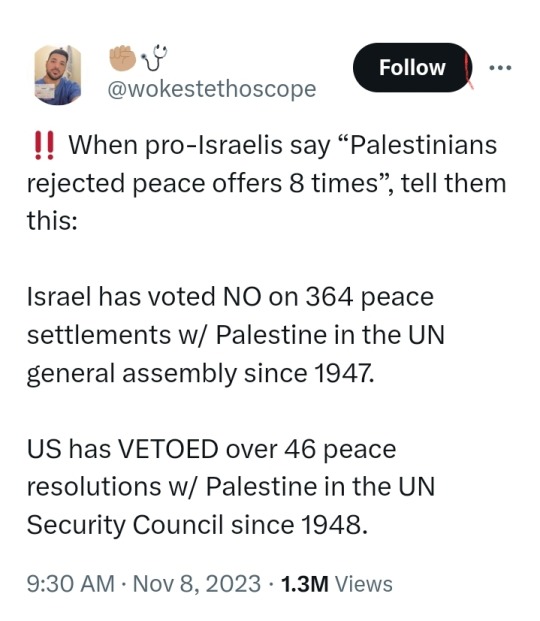
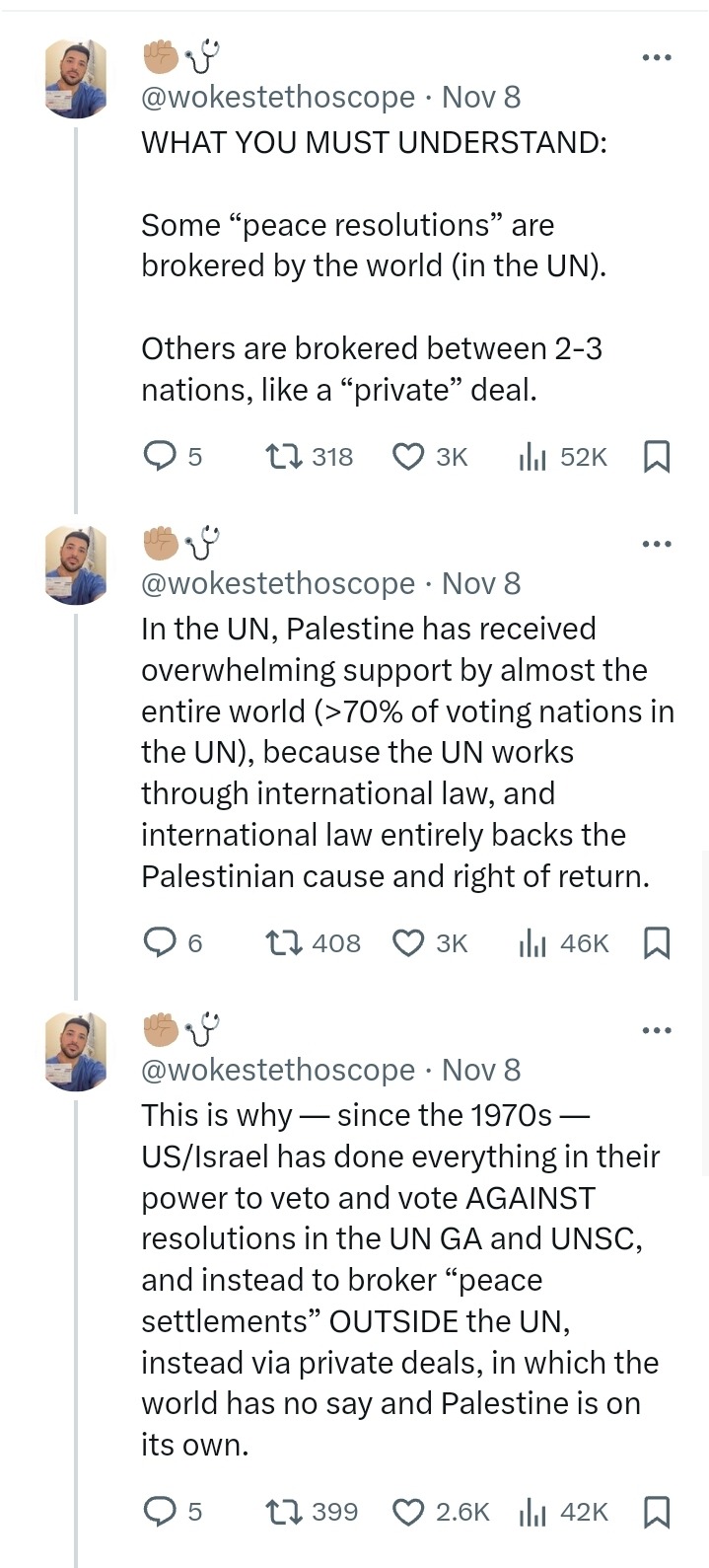

Cursory Google check corroborates all the info except for the number of peace settlements Israel's rejected. I can't find the exact number off the first page of Google and my head is throbbing too much to look deeper. I'm going to leave that for y'all to fact check.
(I went and looked Rafeef Ziadah up to check whether she's still alive (because that's what we do with Palestinians now) and she's safe in London, teaching Politics and Public Policy at King's College. You can find the rest of her poetry here.)
#spoken word#poetry#resistance poetry#war poetry#palestinian poetry#palestinian art#rafeef ziadah#gaza under attack#gaza genocide#free palestine#I/p#war crimes#anti Zionism#racism#human rights#western imperialism#western hypocrisy#colonization#human rights abuses#media manipulation#us politics#islamphobia#world politics#united nations#israel palestine conflict#knee of huss#Youtube
248 notes
·
View notes
Text
"When someone asks me what war is,
I will answer them without hesitation:
names.
Oh, black sea of sunflowers,
receive me.
I’m tired of waiting..."
—Maksym Kryvtsov, poet and fallen Ukrainian soldier
59 notes
·
View notes
Text

W.H. Auden,
“Funeral Blues”
Stop all the clocks, cut off the telephone,
Prevent the dog from barking with a juicy bone,
Silence the pianos and with muffled drum
Bring out the coffin, let the mourners come.
Let aeroplanes circle moaning overhead
Scribbling on the sky the message 'He is Dead'.
Put crepe bows round the white necks of the public doves,
Let the traffic policemen wear black cotton gloves.
He was my North, my South, my East and West,
My working week and my Sunday rest,
My noon, my midnight, my talk, my song;
I thought that love would last forever: I was wrong.
The stars are not wanted now; put out every one,
Pack up the moon and dismantle the sun,
Pour away the ocean and sweep up the wood;
For nothing now can ever come to any good.
(This has always been one of my favorite poems.)
#poem#poet#poetry#sad poetry#poets#poets on tumblr#poets corner#poems and poetry#dead poets society#poetic#writers and poets#short poem#sad poem#love poem#poemas#poems on tumblr#poems and quotes#w.h. auden#Auden#Auden poem#war poetry#war poem#academia#classic academia#aesthetic#chaotic academia#dark academia#literature#english literature#funeral blues
67 notes
·
View notes
Text
At the trial of God, we will ask: why did you allow all this?
And the answer will be an echo: why did you allow all this?
Ilya Kaminsky, Deaf Republic
#Ilya Kaminsky#Deaf Republic#quotes#quote#poetry#poetry quote#poetry quotes#poetry excerpt#poem quote#poem quotes#poem excerpt#war#war poetry
157 notes
·
View notes
Text

by Artur Dron
"And if it is worth writing about something during the war, then not about the war, but about people. Because the defining thing is not that the war happened to us, but that it happened to us. When the russians attacked, we accepted the fight, we fight back. We are afraid and we overcome fear. We bury and we cry. We love and we hug. Here came the very embodiment of horror, but there we were. And there we were. And we will not go anywhere from here".
#ukraine#Ukrainian art#Ukrainian poetry#Ukrainian literature#poetry#poem#literature#Ukrainian culture#text#russia#russia is a terrorist state#fuck russia#genocide#stand with ukraine#support ukraine#genocide of ukrainians#russian war crimes#important#war#war poetry
33 notes
·
View notes
Text
Captain ships as relationship troupes
Patcap

Library Chaps
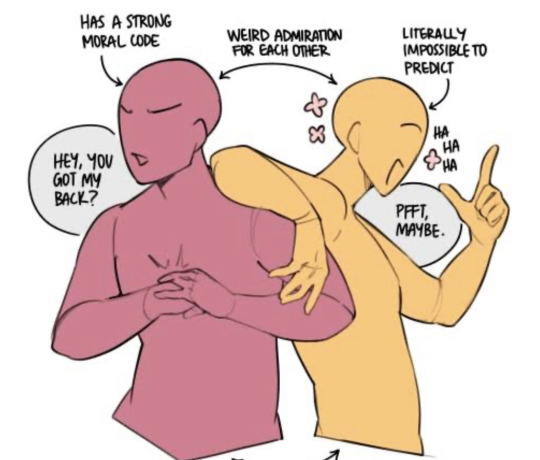
War Poetry

Capvers

Decapitation
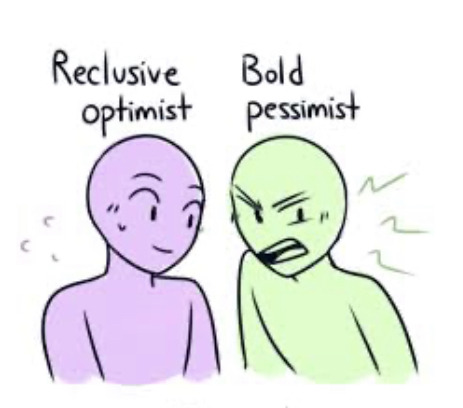
#bbc ghosts#the captain#julian fawcett#thomas thorne#pat butcher#humphrey bone#lieutenant havers#patcap#library chaps#capvers#war poetry
226 notes
·
View notes
Text
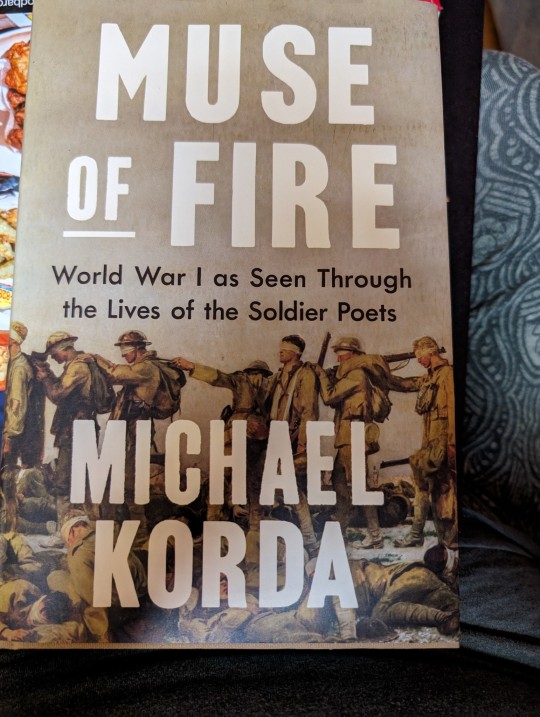
I got a new Dead Gay Poets With Complicated Feelings About Nationalism book! As far as I can tell this book was written explicitly for my specific special interest and I am just emotionally rolling around on the floor right now like a happy dog in the backyard
#bookworm#new book#wwi#the great war#world war 1#world war one#ww1#history#poetry#siegfried sassoon#rupert brooke#robert graves#wilfred owen#alan seeger#isaac rosenberg#poets#war poets#war poetry
52 notes
·
View notes
Text
"If you could hear, at every jolt, the blood / Come gargling from the froth-corrupted lungs, / Obscene as cancer, bitter as the cud / Of vile, incurable sores on innocent tongues,— / My friend, you would not tell with such high zest / To children ardent for some desperate glory, / The old Lie: Dulce et decorum est / Pro patria mori."
Read it here | Reblog for a larger sample size!
#great poem but why on earth did he put an em dash directly after a comma#mr. owen i just want to talk#closed polls#polls#poetry#poems#poetry polls#poets and writing#tumblr poetry#have you read this#dulce et decorum est#wilfred owen#war poetry#wwi
32 notes
·
View notes
Text
Happy 138th birthday to siegfried sassoon rip king you would’ve loved in memoriam by alice winn <333
#ough I should by some of his poetry#anyways#happy birthday babygirl#siegfried sassoon#in memoriam alice winn#wwi#war poetry
12 notes
·
View notes
Text

my sweet old etcetera, by e.e. cummings
#poetry#ee cummings#ww1#ww1 poetry#war poetry#one of my favourite poems#dulce et decorum est pro patria mori#it is sweet and right to die for your country
83 notes
·
View notes
Text

something something fridge poetry
#art soon i just need to finish some shading stuff#actually like. a lot of art soon#but in the meantime#war literature#war poetry#war poem#anti war#ww1 fiction#ww1 history#ww1#wwi#ww2#wwii#wwii era#wwii history#wwii art#fridge poetry#magnet poetry#poetry#poem#original poem
13 notes
·
View notes
Text
My Ginger Tabby
by Maksym Kryvtsov
excerpt translated by Christine Chraibi
When he falls asleep
slowly stretches its front legs
he dreams of summer
dreams of an unscathed brick house
dreams of chickens
running around the yard
dreams of children
who treat him to meat pies
my helmet slips out of my hands
falls on the mud
the cat wakes up
squints his eyes
looks around carefully:
yes, they’re his people:
and falls asleep again.
17 notes
·
View notes
